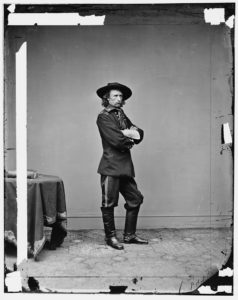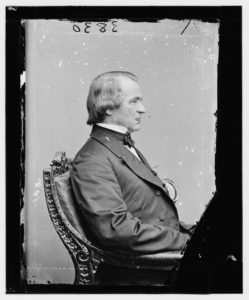On September 3, 1866 Andrew Johnson’s Swing Around the Circle stopped in Cleveland, Ohio. William Stahr referred to President Johnson’s Cleveland speech as the “first low point” of the tour. The crowd was full of hecklers, and the president responded by going off script, way off script. For example, he claimed that ever since he was sworn in as chief magistrate a “subsidized gang of hirelings have traduced me and maligned me …” When Mr. Johnson said that had Abraham Lincoln “lived the vials of wrath would have been poured out on him,” the audience responded “never, never, never.”[1]
You can read much of President Johnson’s remarks in the September 5, 1866 issue of The New-York Times. He might have been defensive about his martyred predecessor’s reputation; he might have been somewhat defensive about the popularity of the traveling companions he brought along for support. The president pretty much began his Cleveland speech by explaining the crowd would not be able to see General Grant because “He is extremely ill” (apparently Grant was in Detroit recovering from a heavy drinking bout). At the close of the president’s speech “loud cries were made for GRANT, FARRAGUT and others of the distinguished party, two of whom responded – Gen. CUSTER and Senator DOOLITTLE – to the immense audience.”
Here’s a bit more from the Times report:
…In this assembly here to-night the remark has been made “Traitor,” “Traitor.” My countrymen will you hear me, [shouts of “yes,”] and will you hear me for my cause and for the Constitution of my country. [Applause.] I want to know when or where, or under what circumstances, ANDREW JOHNSON, not as Chief Executor, but in any capacity, ever deserted any principle or violated the Constitution of his country. [Cries of “Never!”] … If I were disposed to play the orator and deal in declamation to-night, I would imitate one of the ancient tragedies, and would take WILLIAM H. SEWARD, and bring him before you, and point you to the hacks and scars upon his person. [A voice, “God bless him.”] I would exhibit the bloody garments, saturated with gore from his gashing wounds. Then I would ask you why not hang THAD. STEVENS and WENDELL PHILLIPS? I tell you, my countrymen, I have been fighting the South and they have been whipped and crushed and they acknowledged their defeat and accept the terms of the Constitution; and now, as I go around the circle, having fought traitors at the South, I am prepared to fight traitors at the North. [Cheers.] … I will tell you one other thing. I understand the discordant notes in this crowd to-night. He who is opposed to the restoration of this Government and the reunion of the States is as great a traitor as JEFF. DAVIS or WENDELL PHILLIPS. [Loud cheers.] I am against both. [Cries of “Give it to them”] … Now, when these brave men have returned home, many of whom have left an arm, or a leg, or their blood, upon many a battle-field they find you at home speculating and committing frauds on the Government. [Laughter and cheers.] You pretend now to have great respect and sympathy for the poor brave fellow who has left an arm on the battle-field. [Cries; “Is this dignified?”] I understand you. You mat talk about the dignity of the President. [Cries: “How was it about his making a speech on the 22nd of February!”] I have been with you in the battles of this country, and I can tell you furthermore, to-night, who have to pay these brave men who shed their blood. You speculated and now the great mass of people have to work it out. … But, fellow citizens, let this all pass. I care not for my dignity. There is a certain portion of our countrymen will respect a citizen whenever he is entitled to respect. … There is another of them that have no respect for themselves, and consequently they cannot respect anyone else. …
- [1]Stahr, Walter Seward: Lincoln’s Indispensable Man. 2012. New York: Simon & Schuster Paperbacks, 2013. Print. page 472.↩



